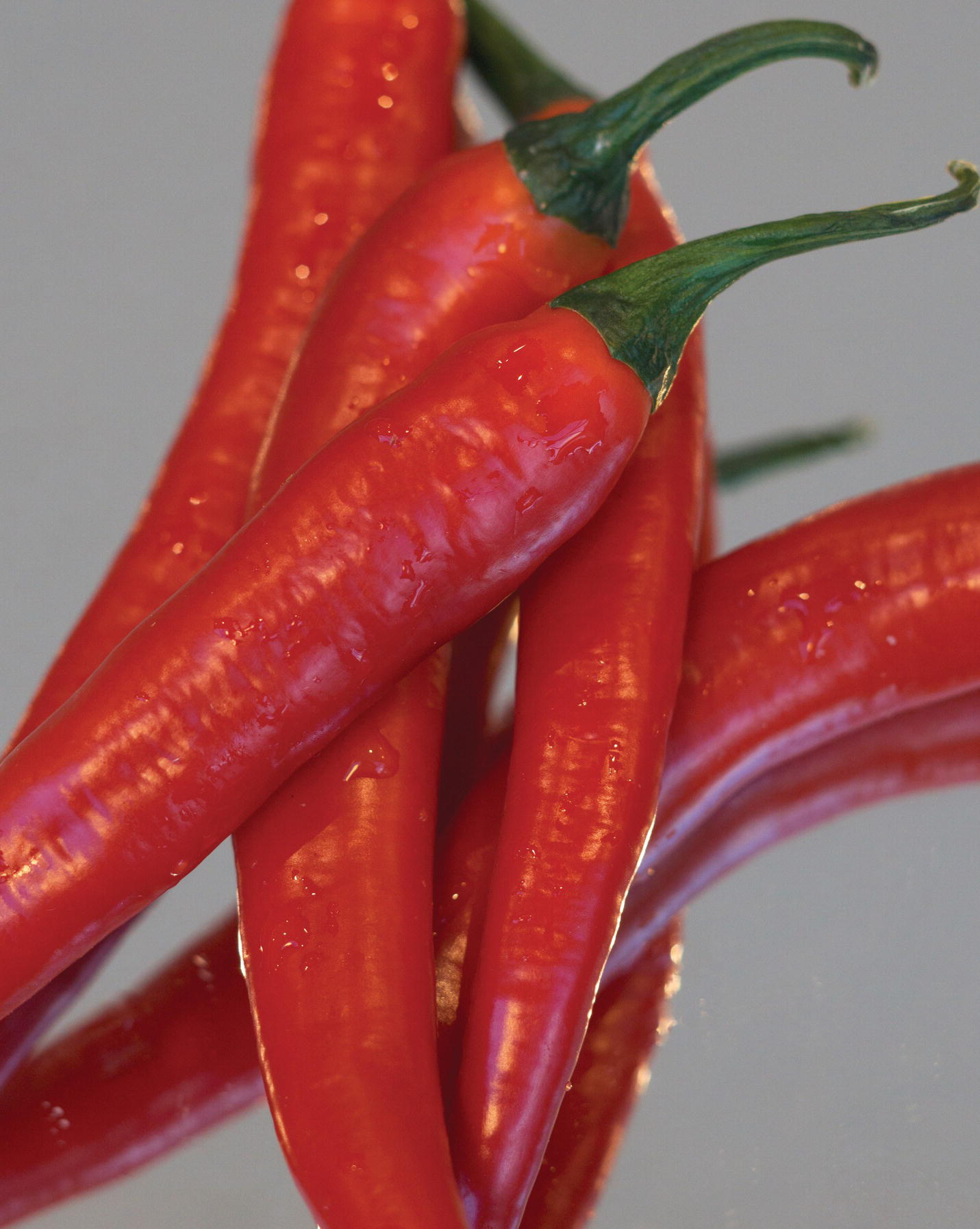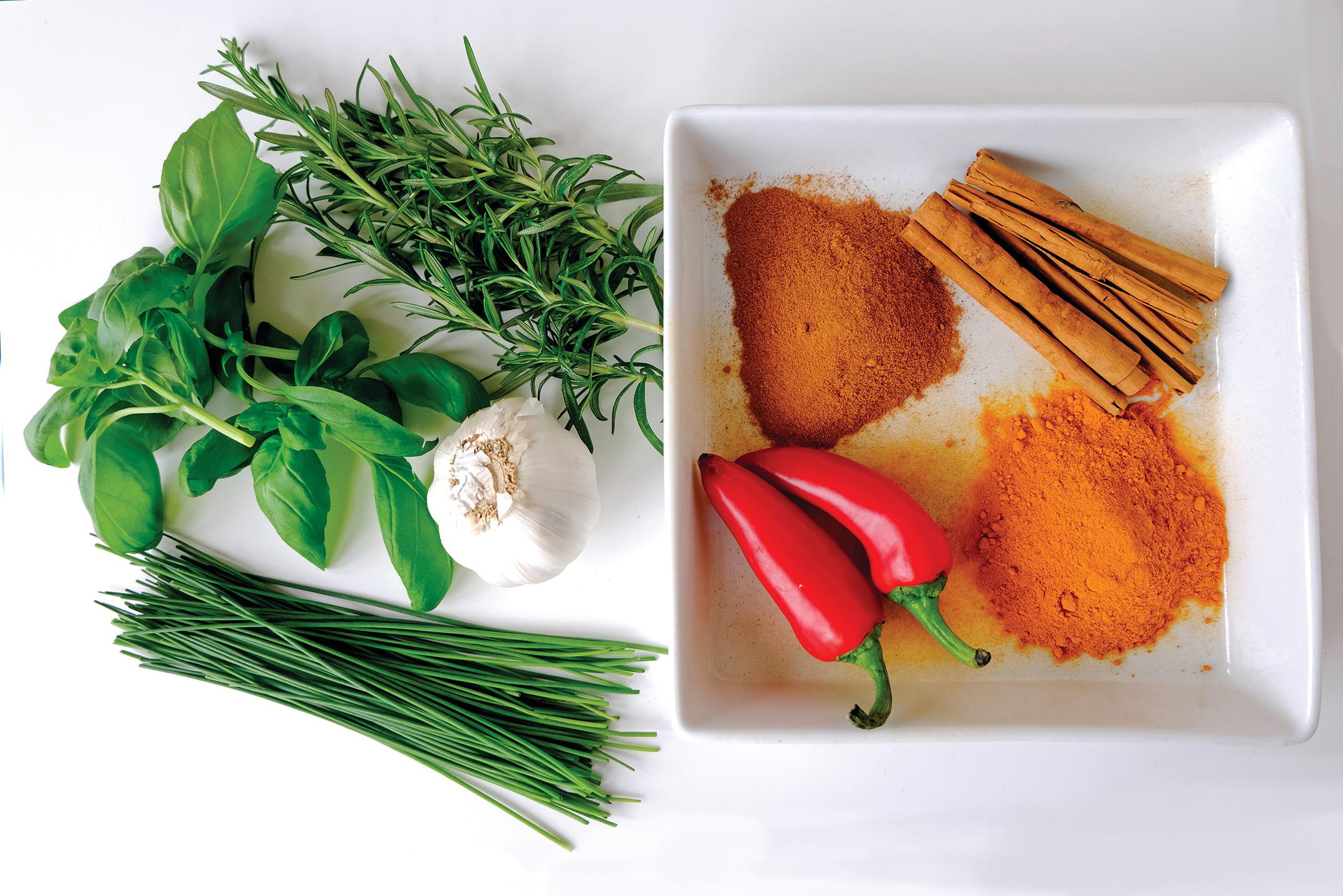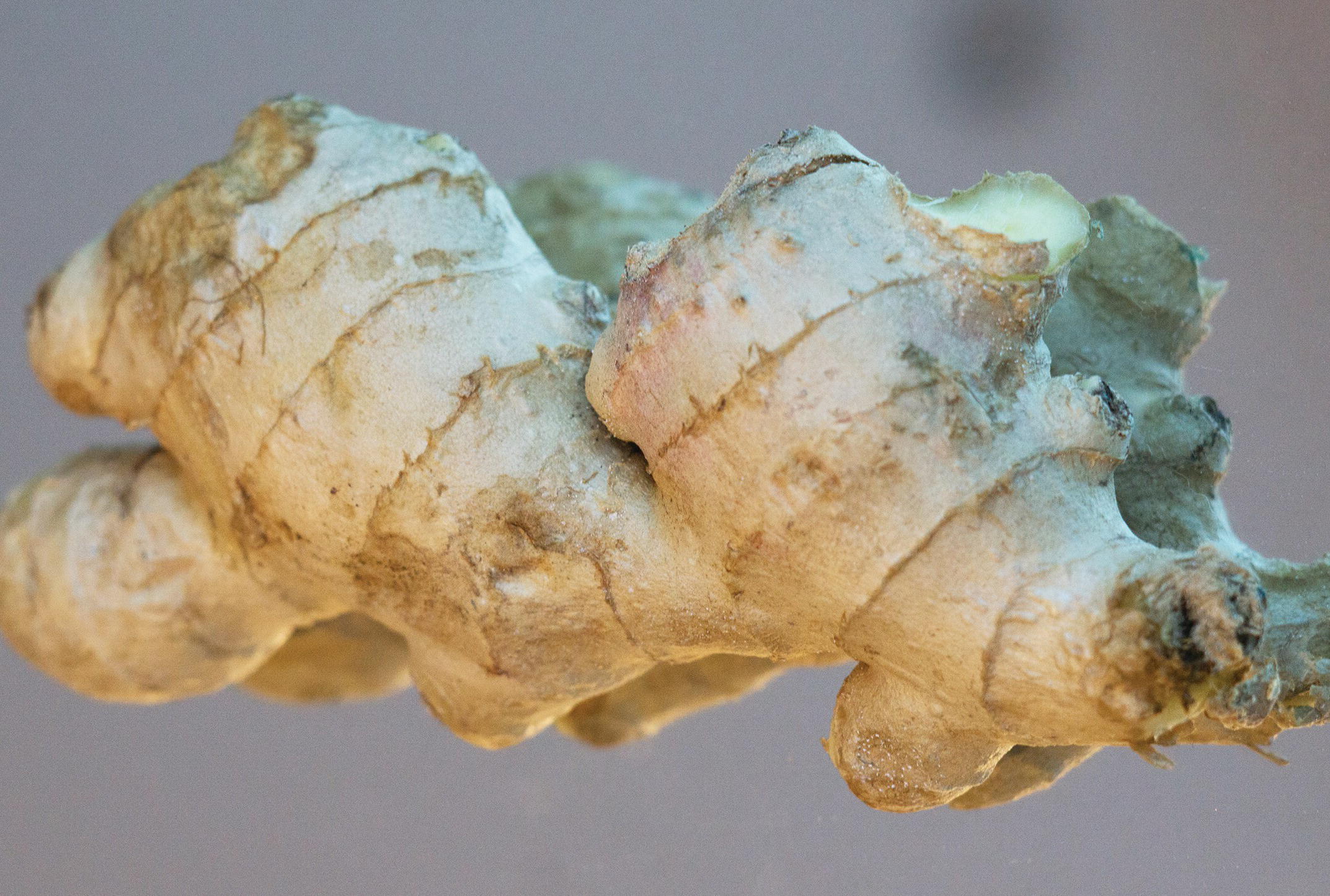CHAPTER 12
MY TOP 12 HERBS AND SPICES

Your extra health insurance. Use herbs as your medicine … because your body will love you for it!
Herbs are superfoods and should be included as much as possible in your diet as they offer a vast amount of nourishment to the body and are a subject all on their own. But I wanted to include some common, easy to use varieties for you so that you can always be in tip‐top condition and create fabulous health always. You will notice some of these are in the anti‐inflammatory and alkalizing lists, but you can be confident in the knowledge that all herbs are good for you in one way or another. You can use them to correct acute and chronic conditions, but just understanding their purpose helps you to choose which ones you need, and adding these as much as possible into your daily regime will help to protect you on a whole new level.
Aloe vera: this has been listed as a superfood as it contains 75 healing compounds, including natural steroids, antibiotic agents, amino acids, minerals, and enzymes. It has been used since Egyptian times as a beauty skin moisturizer and heals burns, cuts, bruises, acne, and eczema. Also, taken internally aloe alkalizes the digestive track preventing over‐acidity, which is the most common cause of digestive complaints such as acid reflux, heartburn, and ulcers. We always have a large plant growing somewhere in our house and just pick a leaf or two off to use on the skin. If you burn yourself it’s like a small miracle. I scalded my head on my hair straighteners recently and the skin on my temple was really red and tight. It was so sore. Within 30 seconds of putting the aloe gel on the burn it had completely disappeared as if it had never happened. It’s in the gel that all the goodness is stored, the vitamins, minerals, amino acids, and antioxidants.
Black pepper: the piperine in black pepper is a powerful cancer‐fighting ingredient and becomes twice as potent when combined with turmeric. The spice has an array of antioxidants that help remove harmful free radicals, protecting the body from cancers and other diseases. It also contains vitamin C, vitamin A, and flavonoids. To derive the greatest goodness from black pepper eat it freshly ground and do not cook it too much. Black pepper helps to stimulate the digestion by encouraging the secretion of hydrochloric acid, which in turn helps digest protein, and it stimulates the enzyme activity in your liver which helps to keep the cleansing process of the liver working efficiently. It also contributes to the stimulation of the brain, making it more active, and improves the skin by increasing blood circulation (you can also use it topically by adding it to honey as an exfoliator). It’s also very effective if you suffer from vitiligo, where the skin loses pigmentation and creates white patches. Due to its antibacterial content, a teaspoon of honey with freshly crushed pepper helps relieve colds, coughs, and chest congestion.
Chilli peppers: containing capsaicin, love them or hate them, you know these little spicy friends can benefit you in many ways. For starters they can help improve migraines by desensitizing and lessening the original pain as the body gets distracted due to the hot sensation! That is a real theory and one which has been known to work. It also relieves joint pain in a similar fashion. It can be applied to the skin to reduce pain: the pain receptors exhaust themselves and deplete the body’s reserves. Once this happens the capsaicin acts as a pain reliever, and can be used effectively, too, with shingles, HIV, and neuropathy. Chilli peppers can help reduce skin conditions such as psoriasis, and fight flu, colds, and fungal infections, as they are full of beta carotene and anti‐oxidants that help support your immune system. Nasal sprays that contain capsaicin are amazing at reducing congestion, so no medication is needed. They combat bad breath, help with allergies and irritation, and promote weight loss by revving up your metabolic rate. Capsaicin is also known for reducing the growth of cancer cells due to its massively powerful anti‐inflammatory properties. So try adding some to your foods on a regular basis.

Cinnamon: This spice has such powerful medicinal properties and you can add it to almost everything. If you look at the history of cinnamon it dates back as far as the ancient Egyptians and was regarded as rare and valuable and fit for kings. Well, they were not far wrong. It’s loaded with antioxidant and anti‐inflammatory properties. It has been linked to a reduction in the risk of cardiovascular disease, and as little as 1 gram per day has been shown to reduce diabetes. It lowers cholesterol, and reduces the growth of cancer cells as it is a potent activator of detoxifying enzymes in the colon, protecting against further cancerous growths. It has incredible antibacterial and antifungal properties and is especially helpful when it comes to its respiratory properties. Trials are also taking place to test how effective cinnamon is against HIV infection, which shows just how amazing this herb is when it comes to boosting your immune system. It’s delicious, protects your health, and gives your body the medicine that it needs.
Cloves: much more healing than you might think and so much more than just a seasoning for your food. They contain important nutrients and are high in antioxidants. They include an ingredient called eugenol, which helps to stop oxidative damage caused by toxins and other chemicals. Ground cloves are high in vitamin C and this can provide support to your immune system. Clove oil has been strongly linked to aiding in protection against oesophageal cancer cells. Cloves can kill off bacteria including E. coli that are linked to diarrhoea and fatigue and can be highly effective when it comes to oral health. It is said to improve your liver function and reverse signs of cirrhosis and scarring of the liver. Some compounds in cloves have been shown to preserve bone mass making it great for osteoporosis. Cloves are also useful in preventing stomach ulcers as they increase the production of gastric mucus. They can also help keep your blood sugar levels in check as they contain nigericin which is found to increase the uptake of sugar from the blood into cells and improve the function of cells that produce insulin.
Coriander: acting like a little Pacman, helping to remove toxins from the body, this wonderful herb is also a powerful antioxidant. It helps scavenge free radicals and fights against cell migration. Helping to prevent cancer it also balances blood sugar levels, making it extremely helpful for diabetes. It can aid in lowering cholesterol, making it a great food source for heart health. Coriander also has potent antifungal and antimicrobial effects and can break down the cell wall of pathogens, preventing them from proliferating. With more research needed, it is thought, at this stage, that coriander is showing massive potential for helping prevent the progression of diseases such as Alzheimer’s and other forms of dementia, as it can help promote good memory. The leaves, stems, roots, and seeds of the whole plant can be used, or for an even more potent form, you can purchase coriander oil and add a few drops to water or juice, or pop it straight under your tongue.
Ginger: I love ginger and try to use it most days in my juices, smoothies, or soups. It is right up there with the other super herbs such as turmeric and contains the compound gingerol, a natural anti‐inflammatory and antioxidant. It can curb an overactive immune system and support the body in many ways. It can treat many forms of nausea, especially morning sickness, gas, irritable bowel and diarrhoea and has been shown to be helpful for cancer patients when suffering side effects from chemotherapy. It’s amazing at reducing muscle pain and soreness and the anti‐inflammatory effects can help with osteoarthritis. It also helps protect the heart and lowers cholesterol levels and its gingerol component may protect you against cancer too. It is a powerful protector against age‐related cognitive decline, and lowers your risk of infection as it inhibits the growth of many different types of bacteria.
Ginseng: the ultimate herb for handling stress. This is widely known as an energizing tonic and is particularly beneficial when recovering from an illness or surgery for its restorative and anti‐infective properties. It promotes regeneration from stress and fatigue, lowers blood sugar and cholesterol levels, promotes relaxation, treats diabetes, and helps to manage sexual dysfunction in men. You want ginseng that contains natural ginsenosides and I prefer the powdered type as you can control exactly the amount that you take. I would suggest no more than 1–2 teaspoons per day, which you can add to your green smoothie or take off the spoon.
Nettle: yes, the type that grows in your garden and is classed as a weed. You can juice it, make it into a tea, but just be careful when you pick it! It might sting so you may need to wear gloves. Nettles are a great immune booster and incredible body cleanser. They contain antioxidants that help defend your cells against free radical damage and protect you from serious disease. A cup of nettle tea in the morning is an ideal way to get your bowels moving and release mucus in the colon allowing for better flushing of excess waste. Nettle offers an array of minerals and vitamins and is great to increase thyroid function. It also helps flush the kidneys and bladder to prevent and soothe urinary tract infections. These little leaves will also reduce inflammation, relieve allergies, help muscle and joint pain, strengthen your heart, and boost your immune system.

Parsley: this tasty green leaf is so much more than a natural breath freshener and has a surprising amount of healing abilities. Did you know that half a cup of fresh parsley contains 40 milligrams of vitamin C? That’s more than half the amount found in a whole orange. It’s also incredibly healing, thanks to its two main components. It contains myristicin and apiol, both of which can help increase the flow of urine. Passing more urine helps remove infection‐causing bacteria from the urinary tract. It is this same diuretic action that also helps prevent premenstrual bloating. Nibbling away on parsley for a few days before menstruation can help increase urine flow, removing excess fluids from the body before the discomfort begins.
Parsley is a great source of folate, a B vitamin that is necessary for producing red blood cells and helping to prevent birth defects. It also contains large amounts of vitamins A, C, K, and iron. The myristicin, an organic compound found in the essential oil of parsley, not only inhibits tumour formation (especially in the lungs), but also activates the enzymes, which helps to fight against oxidized molecules and free radicals in the body. Myristicin can also neutralize carcinogens (toxins) like benzopyrene in cigarette smoke that can pass through the body, consequently fighting against colon and prostate cancer. Parsley is rich with an antioxidant arsenal that includes luteolin, a flavonoid that searches out and eradicates free radicals in the body that cause oxidative stress in cells and acts as an anti‐inflammatory agent. When consumed regularly, parsley is a powerful herb to help fight against osteoarthritis and rheumatoid arthritis. Being high in vitamin A helps the important lymphocytes, or white blood cells, to fight infection in the body. Helping to prevent heart disease and support our nervous system, I think it’s fair to say we should not underestimate this common herb. Next time you are using parsley as just a garnish, think about adding a little more to your plate on a daily basis. It’s the small changes that make the biggest differences!
Rosemary: this wonder herb grows wild in many parts of the world, especially in warm and sunny climates. Used in aromatherapy oils it can help with concentration, making it a fantastic choice if you are sitting an exam or test of some type. It also helps lower stress levels, particularly when combined with lavender oil and has been said to improve mental energy where there is a need to be inspired and have fresh mental clarity. It has been linked to hair growth, particularly in conditions like alopecia, and when rubbed on the scalp has shown signs of improvement due to its stimulatory effects. When eaten it is a rich source of iron, calcium, and B vitamins, and is well known for helping with muscle aches and pains and boosting the immune and circulatory systems.
Turmeric: if you have pain and disease or discomfort in your body then look no further. Curcumin is the main ingredient in this incredible spice and it has massively powerful anti‐inflammatory effects as well as being an extremely strong antioxidant. If you want to experience the full effects of this spice you need large doses, so it would be advisable to take a supplement that contains high amounts of curcumin, and if you are adding lashings of this into your food remember to add black pepper too as it will help your body to absorb better into your blood stream. This orange power powder also helps to support your brain, lowering your risk of heart disease as it improves the function of the endothelium, which is the lining of your blood vessels. It helps regulate blood pressure and blood clotting. It has been a contributor to the death of cancer cells and reduces the growth of new blood vessels in tumours. Many of my arthritic clients have benefited so much from curcumin supplements as it improves aches and pains massively. It’s also fantastic for treating depression as it boosts brain‐derived neurotrophic factors, potentially reversing a shrinking hippocampus, the area of the brain which has a role in memory and learning. It is also said to boost serotonin and dopamine, the two main chemicals which raise mood.